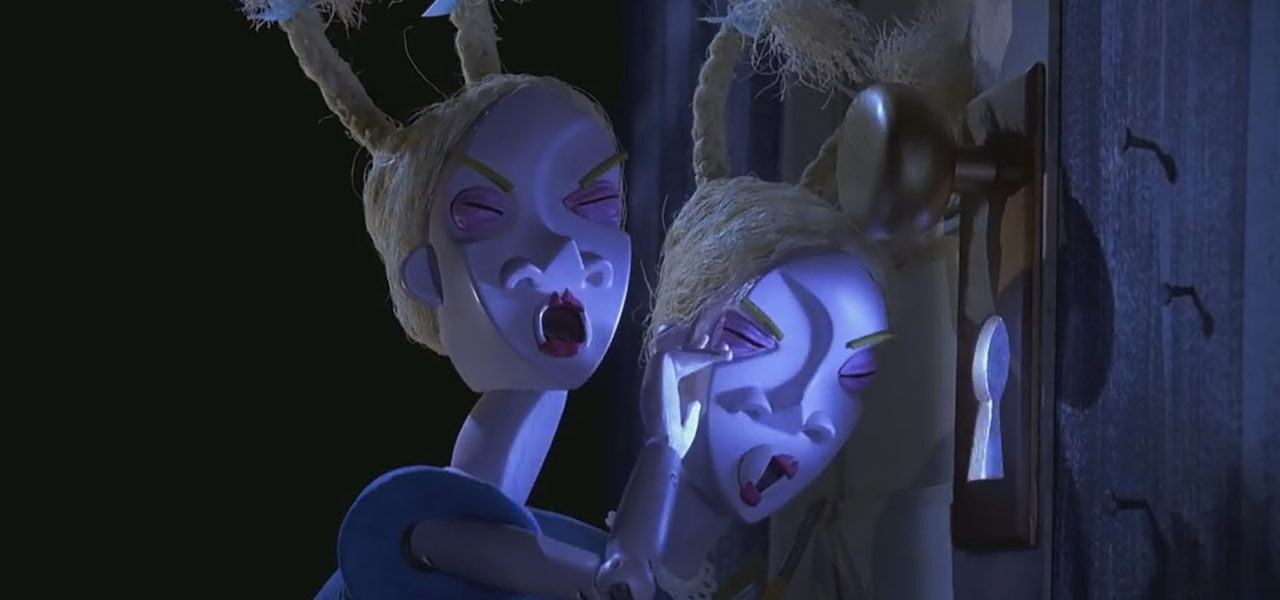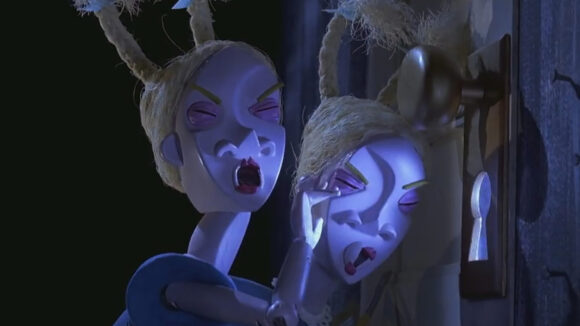

20 Spooky Stop-Motion Classics To Get You In The Mood For Halloween
With the upcoming streaming release of Henry Selick’s horror comedy Wendell & Wild, it seems like a good time to check out some spooky stop-motion creations of yesteryear.
Selick’s The Nightmare Before Christmas helped to popularize horror-themed stop-motion back in 1993, but he was far from the first to use puppet animation to bring monsters, ghouls, and other blood-curdling visions of terror to life. Today we’re going to take a look at some eerie stop-motion films prior to Jack Skellington’s reign as the Pumpkin King.
To kick things off with a bang, here’s a clip from the underrated freak-fest Mad Monster Party? (1967). Rankin/Bass is best known for Christmas specials like Rudolph the Red-Nosed Reindeer, but this feature-length horror spoof starring Boris Karloff is one of the studio’s best and weirdest creations. The character designs were concocted by Mad Magazine stalwart Jack Davis, and the film’s twisted humor, with input from Mad magazine founder Harvey Kurtzman, matches beautifully with the quirky animation. If this skeleton rock band performing “The Mummy” doesn’t put you in the Halloween spirit, nothing will.
— Cartoon Study (@CartoonStudy) October 21, 2022
Many of the very earliest films to use stop-motion dealt in horror imagery, like J. Stuart Blackton’s The Haunted Hotel (1907) and Wallace McCutcheon’s The Sculptor’s Nightmare (1908). You can see supernatural beings set the table in these excerpts from Segundo de Chomón’s trick film The House of Ghosts (1907).
— Cartoon Study (@CartoonStudy) October 21, 2022
Polish-Russian artist Ladislas Starevich, a pioneer of puppet animation, began his career animating dead insects. By the time of his terrifying masterpiece The Mascot (1933), he was crafting intricate puppets made of chamois leather, using tweezers to adjust their expressions. This deranged stop-motion epic features Satan himself inviting a twisted array of bizarre creatures to the Devil’s Ball.
— Cartoon Study (@CartoonStudy) October 21, 2022
Alexandre Alexeieff and Claire Parker’s Night on Bald Mountain (1933), a forerunner of the Bald Mountain sequence in Fantasia, was created using an invention called the pinscreen. Alexeieff and Parker’s device allowed movement through the manipulation of thousands of small pins that could be pushed in and out of a grid to create forms (like the later Pin Art toys). The amount of detail they were able to achieve is stunning, and while this isn’t technically stop motion, it’s too good not to include here.
— Cartoon Study (@CartoonStudy) October 21, 2022
George Pal, another workaholic madman, used a process in his cartoons called replacement animation, where he and his team would create different individually carved wooden puppets for each frame of animation to allow for greater flexibility of movement. A typical seven-minute Puppetoon required 9,000 carved puppets. The haunted house Puppetoon Jasper in a Jam (1946) contains dated stereotypes, but also features fantastic visual imagination and a swinging jazz soundtrack by Charlie Barnet and his Orchestra.
— Cartoon Study (@CartoonStudy) October 21, 2022
Czech animator Jiří Trnka, sometimes called “the Walt Disney of Eastern Europe,” directed numerous classics, but one of his lesser seen efforts is the wordless short The Devil’s Mill (1949). In the film, an organ grinder meets a demon while lodging in a creepy old house. Great use of sound here.
— Cartoon Study (@CartoonStudy) October 21, 2022
Ray Harryhausen, famed for his stop-motion effects in live-action fantasy films, has inspired countless animators with his lifelike monsters and skeletons. As Henry Selick himself said, “I was four or five years old and my mother took me to a Ray Harryhausen film, The Seventh Voyage of Sinbad (1958). He is the master of stop-motion.”
— Cartoon Study (@CartoonStudy) October 21, 2022
Bruce Bickford created some of the finest clay animation ever done for Baby Snakes (1979), a filmed version of Frank Zappa’s Halloween concert at New York City’s Palladium Theater. Bickford’s hallucinatory transformations are unbelievably mesmerizing and disturbing. Frank Zappa described Bickford as “a person who animates lumps of clay and makes them do things you won’t believe.”
— Cartoon Study (@CartoonStudy) October 21, 2022
Russian animator Nikolay Serebryakov directed the odd short Separated (1980), about a brother and sister who are pulled apart by rich oligarchs named The Three Fat Men. The discordant music and off-kilter visuals in this ghostly scene are bone-chilling.
— Cartoon Study (@CartoonStudy) October 21, 2022
Stop-motion legend Will Vinton, who invented and trademarked the term “Claymation,” directed the little-seen stop-motion feature The Adventures of Mark Twain (1985). This G-rated movie contains what must be one of the most horrific scenes in any animated feature.
— Cartoon Study (@CartoonStudy) October 21, 2022
Vinton’s studio also produced the Emmy-winning Halloween special Claymation Comedy of Horrors (1991), directed by Barry Bruce. This goofy burst of ghoulish humor is full to bursting with deliciously bouncy squash-and-stretch goodness. In 2005, Will Vinton’s studio was rebranded Laika, and they’ve continued to produce creepy films like Coraline and ParaNorman.
— Cartoon Study (@CartoonStudy) October 21, 2022
Some of the greatest and most creative stop-motion ever made comes from Czechoslovakia. The dark tone and German Expressionist set design of Jiří Barta’s jaw-dropping stop-motion feature The Pied Piper (1986) anticipates Tim Burton movies like The Corpse Bride.
— Cartoon Study (@CartoonStudy) October 21, 2022
Another giant of Czech animation is Jan Švankmajer, a surrealist genius and acknowledged influence on Henry Selick, Terry Gilliam, and Guillermo del Toro. His movie Alice (1988), the strangest of all adaptations of the Lewis Carroll story, is populated by skeletons and dead-eyed dolls. Every shot in a Švankmajer film is overflowing with visual inventiveness.
— Cartoon Study (@CartoonStudy) October 21, 2022
Some of the most haunting stop-motion films come from the Brothers Quay, two guys from Pennsylvania whose work looks like it was created on a different planet. Their acclaimed short Street of Crocodiles (1986) is a truly eerie experience. It’s unsettling and hypnotic, full of loaded metaphorical imagery that’s difficult to decipher.
— Cartoon Study (@CartoonStudy) October 21, 2022
The 1980s series The Trap Door, created by Terry Brain and Charlie Mills, takes a more lighthearted, comical spin on haunted house tropes. There’s a fun balance of creepy monsters and dry British humor here.
— Cartoon Study (@CartoonStudy) October 21, 2022
The Oscar-nominated short The Sandman (1991) was directed by Paul Berry, a supervising animator on James and the Giant Peach and Monkeybone. This nightmarish film boasts gorgeously stylized sets and a sinister conclusion that I will not spoil here.
— Cartoon Study (@CartoonStudy) October 21, 2022
Aardman – the studio behind Wallace & Gromit – tends to be a cheerier alternative to the darker worlds created by Burton and Selick, but they’ve delved into gallows humor a time or two. Not Without My Handbag (1993), directed by Boris Kossmehl, tells the story of a woman who is dragged to Hell for not keeping up with her washing machine payments.
— Cartoon Study (@CartoonStudy) October 21, 2022
Henry Selick’s frequent collaborator Tim Burton directed his first stop-motion film while working as an animator at Disney. Vincent (1982) was made as a tribute to horror movie icon Vincent Price, one of Burton’s childhood heroes, and Price agreed to narrate the film for the young unknown. The film’s macabre humor, spindly character designs, and gothic visual sensibility have remained essential elements of Burton’s characteristic style.
— Cartoon Study (@CartoonStudy) October 21, 2022
Before The Nightmare Before Christmas, James and the Giant Peach, and Coraline, Henry Selick worked as an animator at Disney and directed bumpers for MTV. He also created a pilot for a potential tv series called Slow Bob in the Lower Dimensions (1991), in which an attic-dwelling weirdo with a deformed back and conjoined twin sisters is sent to an alternate dimension by talking lizards (just your average sitcom, in other words). It’s hard to imagine anything this fascinatingly weird getting picked up as a tv series, but it’s certainly a visual feast, full of distinctive hand-crafted personality. As Henry Selick once said in an interview, “Stop-motion is sort of twitchy; you can feel the life in it. If we were to remove that completely, there’d be no point in it.”
— Cartoon Study (@CartoonStudy) October 21, 2022
Happy Halloween, everybody! Don’t eat too much candy. Instead, watch this amazing stop-motion Trolli ad by Becky & Joe from Blinkink. Enjoy!
— Cartoon Study (@CartoonStudy) October 21, 2022
Pictured at top: Slow Bob in the Lower Dimensions by Henry Selick.
Special thanks to Puppetoon Productions, Adam Maciaszek, and @EasternOoC on Twitter
